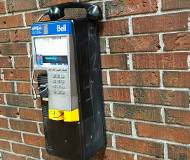10/10/2018
Illinois Court Blocks Traffic Stop Based On Dubious TipA claimed anonymous tip, without evidence of reliability, cannot be the sole justification for a traffic stop under Illinois appellate ruling.

Anonymous tips, possibly made up after the fact, cannot be used to justify a traffic stop under a ruling Friday by the Illinois Appellate Court. A three-judge panel overturned the lower court decision that imposed a thirty-day jail sentence on motorist Jose Lopez.
Lopez had a suspended driver's license, but that did not stop him from getting behind the wheel of his black Ford Expedition on August 3, 2014. Chicago police officer Reyes Martinez claimed he received an anonymous call that day alerting him to a "male Hispanic" drunk driver on Pulaski Road in a black Expedition with a license plate beginning with the letters NZ1 (the plate on the vehicle belonging to Lopez began with N211).
Officer Martinez has no idea who made that call, nor did he know how much time had passed between the call and spotting Lopez. He just assumed that the call had been recent when he caught up to the SUV. Lopez did not violate any traffic laws, so after following for a while the officer decided to pull him over anyway.
Lopez was not drunk. Instead, he was arrested for driving on a suspended license. His lawyers appealed, saying a traffic stop based on a dubious tip was invalid. The appellate court agreed, pointing out the difference between his case and the anonymous tip the US Supreme Court found was a valid justification for a traffic stop four years ago in Navarette v. California (view case).
"The Navarette tipster specifically alleged that she was an eyewitness to the driver's dangerous conduct," Judge Mathias W. Delort wrote for the court. "In this case, Officer Martinez testified that the tip was about 'a DUI driver,' with no specific allegations as to what the tipster witnessed or had particular knowledge of to conclude that the driver of the black Expedition was intoxicated. Instead of specific allegations of wrongdoing and a basis for the tipster's knowledge of the wrongdoing, the tip contained nothing more than a conclusory allegation of drunk driving and no alleged basis for that knowledge."
There was no evidence here that the tip was made by calling 911, which would have left proof that a call was actually made. The judges here pointed out that the tip was much flimsier than the one the high court in Navarette called a "close case."
"Officer Martinez did not observe any violations or even suspicious behavior by defendant," Judge Delort concluded. "Without any specific allegation or indication of wrongdoing, Officer Martinez could not have had a reasonable suspicion that defendant was engaged in an ongoing crime... Because the tip was neither reliable nor sufficiently detailed to justify a traffic stop, we hold that Officer Martinez violated defendant's constitutional right to be free from unreasonable seizure."
A copy of the ruling is available in a 100k PDF file at the source link below.


